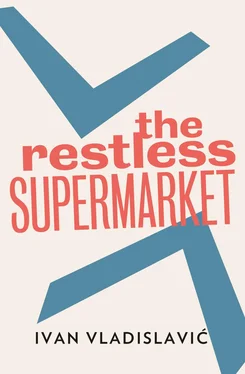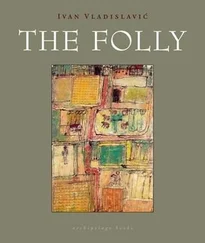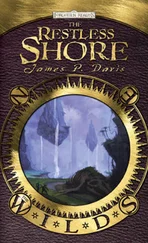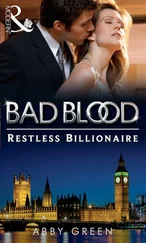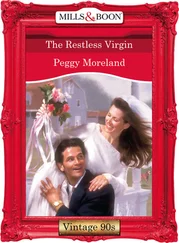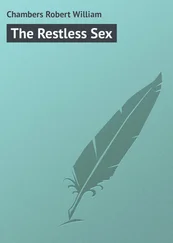The shanty town did not fit its new site at all well. On one side, it was jammed up against the wall of a bank. A dreadful bleating came from beneath those crumpled iron sheets. On the other side, a black hole yawned with unearthly anticipation. A goat plunged out of an alley and vanished down the abyss. A trio of mongrels chose a cannier path and raced out among the cars. Then the first human inhabitants stumbled after them and gazed about numbly. Almost at the same time, the habitués of the cafés and fast-food joints began to scramble out from under tables and chairs and hurry away down the Avenue.
Fluxman had a strong stomach. He took his rucksack in his lap, as if it were a frightened child, and scanned the tumult’s ebb and flow.
Most of the avenue dandies had run away at the first opportunity. But a gang of young bucks from the musical theatres were using their canes to drive the swarthy settlers back into the shanties. As fast as they were routed, others took their place. Then a whole tribe in luminous bubus came spilling out in a rush, men, women and children, reeking of woodsmoke and unthinkable foodstuffs.
As usual, when you needed a waiter there was none to be seen, and so Fluxman picked his way through the overturned furniture and scouted around inside. Fresco himself had scarpered through the back door. Fluxman fetched down a bottle of whiskey from a shelf. In the mirror behind the counter, he saw that he was wearing a velvet cap with an ostentatious aigrette — the sort of thing an Athos might have liked — and he threw it away with a weary sigh. Disconsolately, he clamped an assortment of notes under the spring-loaded tongue of the till. Then he secured the bottle in his bag, took out an apple to eat on the way, and went back into the street. The young bucks had commandeered a tram and stalled it in the middle of the Avenue. From this redoubt, they were launching attacks against the garish tribesmen, trying to drive them back into their uprooted town.
Fluxman hurried on his way. In the east, where the Avenue tapered away into twilight, it was raining cats and dogs. As soon as he was clear of the wreckage, he turned aside into a narrow street and went bravely into the dusk.
*
In days gone by, Maison Munnery, a squaredavel under moth-eaten thatch, had commanded a view of the old city, with the esplanade and the yacht mole beyond it; now it looked down on a jumble of factory roofs and chimneys. Unusually for Alibia, this industrialization had been gradual, a heaping up of cubes and cones and frusta like offcuts from a geometer’s bench, and it took Fluxman an hour to carve his way through it. By the time he broke out of that intricate litter onto the railway lines on the valley floor, night had fallen thickly all around. Munnery’s place was an oasis of glaring light on the dark hillside and Fluxman kept his eyes on it as he ascended. Climb every mountain … When he drew closer, he saw the military searchlight parked in the rockery on the slope behind the house, with its beam trained down on the putting green.
Munnery was practising, and Fluxman paused in the shadows to watch.
Alibia’s most famous par 5 had fallen into Munnery’s possession by chance. Returning from a jog up Capitol Hill one Sunday morning, he had found it laid out there like a gift. The sight of it caused a flutter in his heart. He should return it at once to its rightful owners. He went straight in and fetched down his books of maps and registers of title deeds, fully intending to make the transposition. But his pencil remained poised over the page, irresolute and feeble. He was an avid golfer and the thought of his own private practice green was more than he could resist. They would not even miss it at the club, he told his wife.
Little Horst, Munnery Junior, was now playing with a bucket and spade in the largest bunker. Mrs Munnery, Patsy as she was known, had just left him there, and her skirt was still caught up in her panties at the sides. She was sitting on the doorstep, wriggling her toes in the grass to rid them of sand. Fluxman had never seen her legs before, and he was struck by how pale they were. Munnery himself was wearing plus-fours in the MacLaren tartan and a mismatched pair of spiked shoes, one that was white with black fringes and one that was red all over. He affected a little shuffle and gave the ball a tap. It curved across the green, tracing an s in the dew, and rolled down towards the cup. Fluxman waited for the ball to drop before he stepped from his hiding place into the light. Mrs Munnery hurriedly untucked her skirts. Junior demolished a castle with a backhander from the spade. Munnery dropped his putter with a cry of delight and advanced to greet his visitor, embraced him warmly, and drew him at once through the bright doorway.
*
Settling Fluxman in his study, Munnery went off to pour them each a whiskey from the bottle his guest had brought. As soon as he found himself alone, Fluxman rose from the armchair he had been pressed down in and turned about on the mat, gaping in amazement. The room was papered with printed sheets. Not just the walls but the door, the window behind the desk, the cupboards, the shelves, the desk itself — every surface had a page stuck to it. There were even papers pinned to the ceiling, with their edges curling downwards, and untidy stacks on the floors, weighted by rusty cogs and crankshafts and lumps of wood, with their edges curling upwards. Between the reciprocal curves of ceiling and floor, Fluxman felt curiously suspended, like an afterthought in brackets. The papers rustled and waved, making visible an imperceptible breeze, and it seemed as if the room was breathing uneasily and muttering to itself.
Years of practice had made of Fluxman a shameless scrutineer. He stepped closer to the wall and examined the peeling skin. Glacier ~ granite ~ grasslands ~ grike. It was Munnery’s ‘Dictionary of Geographical Terms’. His life’s work. The page proofs. Simoom ~ sinkhole ~ slickensides ~ solifluction. Fluxman tugged at a few dog-ears. Every page was securely attached with tacks or loops of tape, drawing pins or tees. Munnery had been known as the most fastidious of proofreaders, a stickler for sequence and consequence, a meticulous keeper of order. Finding the great project of his life in this disarray shook Fluxman. Perhaps he had come just in time. Or was he already too late?
When Munnery returned with the drinks, he found his colleague tactfully seated, flipping through the Phone Book, which he had taken from his rucksack.
‘A toast,’ said Fluxman. ‘To the records!’
This was the battle cry of the Society, the oath with which they closed their gatherings, and its import was not lost on Munnery. ‘The records!’ he echoed, and they clinked glasses. ‘Welcome back.’
‘My pleasure.’
They drank. Fluxman, examining his old friend for signs of deterioration, noted that his pullover was back to front. Why did Mrs Munnery let him wear the spikes inside? It would ruin the floors.
‘I thought you were gone for good,’ said Munnery.
‘That was the idea. But I’ve changed my mind, as you see.’
‘Why?’
‘Some observations I’ve made lately have led me to believe that looking the other way might not be the answer.’
‘It’s a fact that you’ve behaved very selfishly, turning your back on us when you might have done something.’
‘You misunderstand. My presence here is as selfish as any of my old refusals. I thought I could manage well enough as Alibia declined, preserving my own little corner amidst the ruins. Unfortunately, it isn’t that simple. While we still have the tools to wield against chaos, even if we choose not to, we may feel safe. While we are models of order ourselves, and stuffed with the assurance of our own solidity, we may hold ourselves up to one another as examples and reflect that there is something wrong with the world we live in. But when we ourselves succumb …’
Читать дальше
